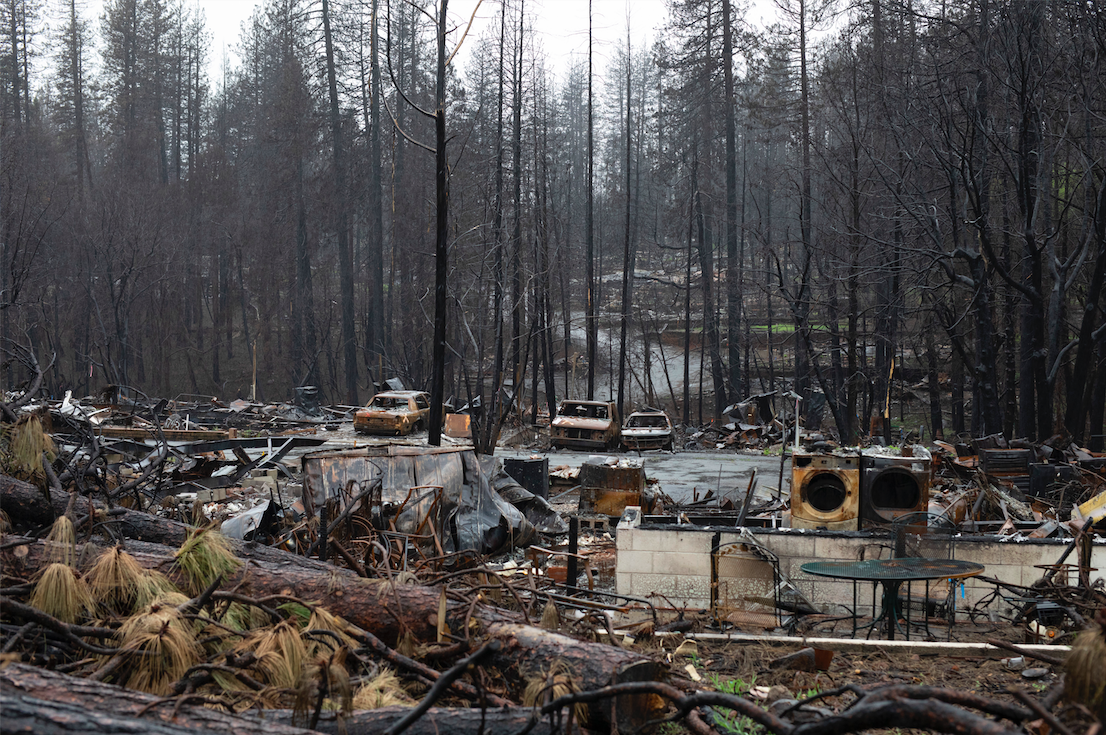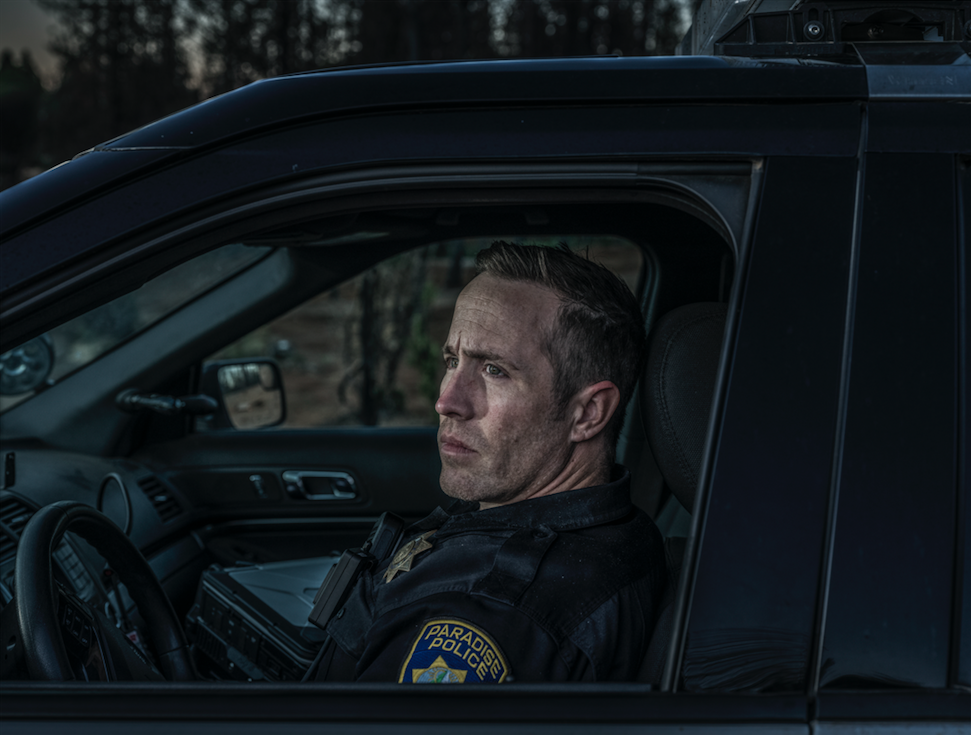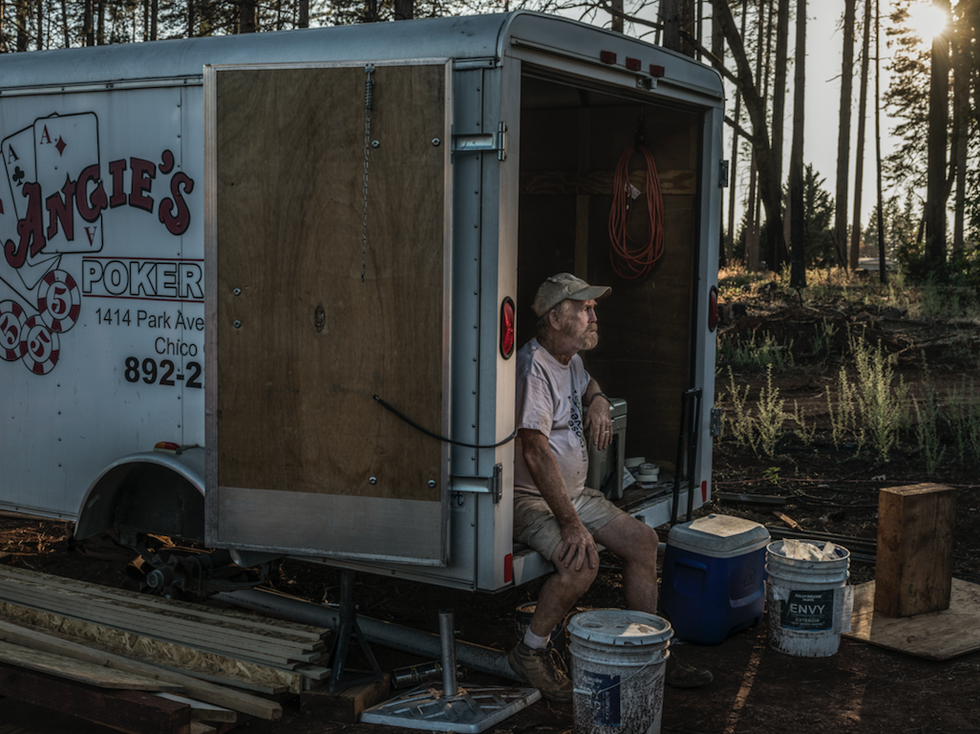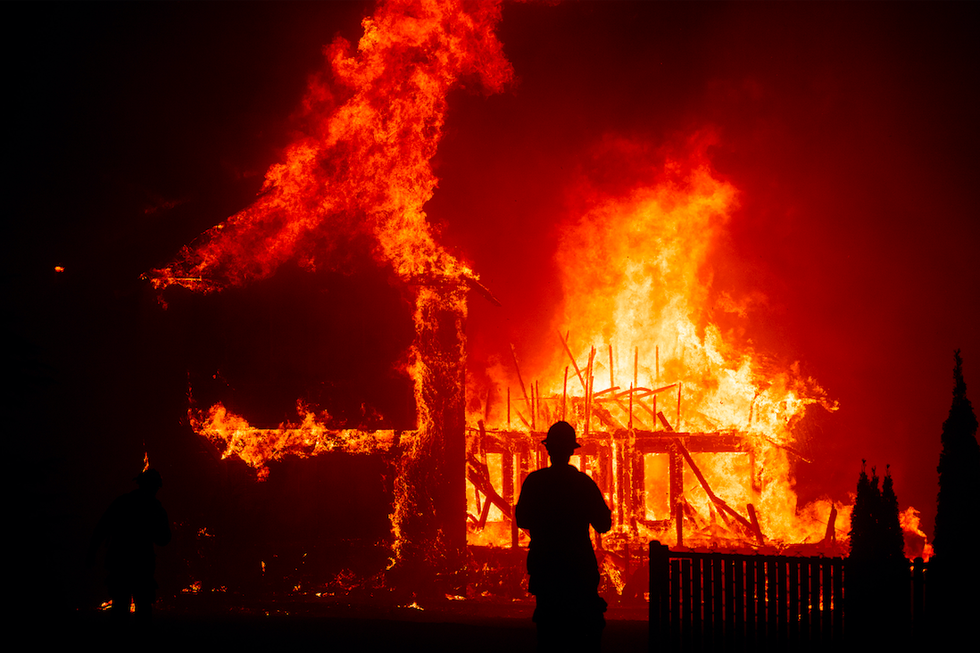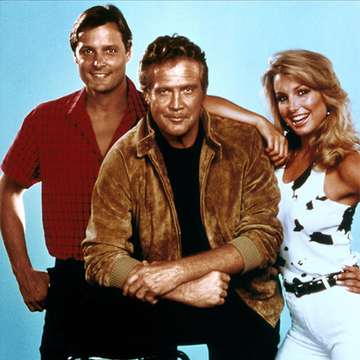If you want to imagine how humanity will meet its increasingly likely demise, you could watch a classic disaster movie like, say, The Day After Tomorrow or Armageddon, all CGI tsunamis and Styrofoam asteroids hurtling through space towards our tiny vulnerable dot. Or you could watch the 10-minute, pre-titles sequence of Rebuilding Paradise, Ron Howard’s new feature-length National Geographic documentary about a town destroyed by a devastating California wildfire in 2018. Far more likely, if this collection of news reports and phone footage is anything to go by, we’ll be sitting in our cars, in a line of traffic, as the sky turns black, the trees go up like matchsticks, and the flames lick at the windows. It is mundane and terrifying and oh so plausible.
The Camp Fire of November 2018 was the deadliest in California’s history. Started by a fault in a powerline, a “perfect storm” of weather conditions mean that it spread at lighting speed. After burning for more than two weeks – though most of the damage happened in the first four hours – it had killed 85 people, destroyed over 18,000 structures and burnt the town of Paradise to the ground. Yes that’s right, Paradise; it also incinerated the neighbouring town of Concow, but Rebuilding Concow, of course, does not have the same zing.
Howard, to be fair, has not only previous experience with fire films, but personal motives for picking Paradise – his mother-in-law lived there for her final five years – so he sent a crew to observe the residents of the town as they picked up the pieces (in some cases quite literally) of their ruined lives.
His ensemble of interviewees are something of a gift: the self-described former “town drunk” who is now the mayor (who also, somewhat confusingly, bears more than a passing resemblance to Howard himself); the square-jawed policeman who seems constantly on the brink of tears; the powerhouse superindendent of schools and her devoted, smiley husband; the smouldering high school psychologist who must, you suspect, have featured in a few teenage dreams in her time.
All are struggling with personal problems related both directly and indirectly to the fire: not just losing their homes and livelihoods, but also dealing with fracturing marriages, PTSD, long-term health risks, etc. They all feel that rebuilding Paradise – and getting an apology and recompense from Pacific Gas & Electric, whose power lines started the spark – is the only way to set things right.
But should they rebuild it? This is a question touched upon only glancingly in the film, during a Senate hearing about securing housing for the 50,000 displaced citizens. “Don’t we have a responsibility to stop building if it’s going to be in areas that are not defensible?” asks an assemblywoman. “Is there a point at which we say, ‘You know what, these areas are just going to be off-limits to development because it’s just going to be too dangerous’?” The response from state assemblyman James Gallagher is crisp: “Should we de-prioritise places that have earthquake risk, should we deprioritise areas that have flood risk? We’re going to start running out of places we can build in this state.”
Both have a point of course, but both also suggest a tacit acceptance of the effects of manmade environmental disaster – for yep, that’s largely what we’re dealing with here – as inevitable, rather than something that should be actively tackled. Not for the first time President Trump, the only person for whom the town’s name appears not to be memorable (“We just left Pleasure,” he begins an on-the-ground press conference, before a chorus of voices correct him), seems also to miss the bigger picture. “We just left Paradise, and what we saw is, you know, unacceptable,” he tells gathered reporters, as if nature’s outrages are, you know, nothing to do with him. (America’s carbon dioxide emissions are second only to China’s.)
There is however, at least one cautionary voice: a young pyrogeographer, Zeke, who studies fire in nature and understands its patterns. We see him only outside the town, in the woods – a literal voice in the wilderness – contemplating the baby trees which, unless burned pre-emptively, will act like kindling again come the dry season. But no one wants to hear it. Fire in the wild, as they understand it, is bad. “We like to think we can control nature,” he says, resignedly. “Fire doesn’t care what we think.”
Perhaps Ron Howard is too nice a guy, or too personally invested in the town of Paradise, to linger too long on the uncomfortable questions. Instead, the film uses, as one narrative drive, the question of whether or not the senior class of Paradise High will get to have a real graduation on their own playing fields – a problem which now, in this pandemic year, with weddings, funerals, and religious holidays cancelled and compromised everywhere you look – seems like relatively small beer.
Yet Howard doesn’t totally pull his punches. The film ends with a minute-long montage of other disasters exacerbated by climate change – wildfires in Australia, droughts in Cape Town, floods in Bangladesh – to remind reviewers that one high school graduation does not a happy ending make. Of course, it’s not up to the residents of Paradise, California, or those of Valhalla, New York, or Eden, North Carolina, or Utopia, Texas, to save us from ourselves. It can only be, as we all know, a collective effort. It’s all of us, or it’ll be none of us.
Rebuilding Paradise is on National Geographic on 24 November
Like this article? Sign up to our newsletter to get more articles like this delivered straight to your inbox
Need some positivity right now? Subscribe to Esquire now for a hit of style, fitness, culture and advice from the experts

Miranda Collinge is the Deputy Editor of Esquire, overseeing editorial commissioning for the brand. With a background in arts and entertainment journalism, she also writes widely herself, on topics ranging from Instagram fish to psychedelic supper clubs, and has written numerous cover profiles for the magazine including Cillian Murphy, Rami Malek and Tom Hardy.
